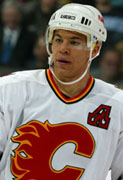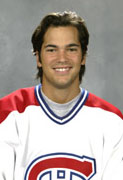Playing the Game (Page 2)
Building Careers
After leaving Blaney, Pasternak, Meehan resolved to create his own company and focus on representing hockey players. His parents were stunned by the news that their son, the rising legal star, was walking away from a sure thing to venture into largely uncharted territory. His mother wept.
"I had a lot of friends and colleagues who really wondered what the heck I was doing," says Meehan. "Looking back, I guess it was a bold move. I was young. I didn't know any better."

Jarome Iginla
Instead of trying to sign players already active in the NHL, Meehan decided to approach the families of young talents before they were drafted by NHL teams. He scouted teenaged players and travelled from town to town to meet with their parents. Meehan prefers representing hockey players from the very beginning of their professional careers.
"I find it incredibly gratifying to watch young guys develop into pro players - to help them out at the beginning and to help them plan for life once their playing careers are done. To know that I had the opportunity to watch players like Al MacInnis and Wendel Clark develop into stars and that I played a supporting role in that process - that provides me with an enormous amount of satisfaction."
As Meehan was building his own career in hockey, he struck gold in the early 1980s with a baby-faced American youngster who was shattering scoring records in the Quebec Major Junior Hockey League that had been set by the likes of Guy Lafleur and Mike Bossy.
This gifted young centre, Pat LaFontaine, hired Meehan to represent him and months later, the player was selected third overall at the 1983 NHL entry draft. After starring in the 1984 Olympics, LaFontaine quickly established himself in the NHL as a dynamic offensive talent.
The Art of the Deal
Having a rising star among his roster of clients made it easier for Meehan to sign up other players. His business grew. And together with a new generation of player agents who pressed more forcefully for better deals for their clients, Meehan began to have an impact on how well hockey players were paid.
According to the National Hockey League Players' Association (NHLPA), the average salary in 1990-91 was $271,000. The average salary last season was $1,790,290.
"He has been described as a 'smiling gorilla,'" says Jason Kay, managing editor of The Hockey News. "He is known as a very charming man, certainly not someone with a reputation for being abrasive. But he is a tough negotiator and he serves the best interests of his clients."
So are Meehan and his fellow agents to blame for the skyrocketing salaries of NHL players and the financial woes afflicting many NHL teams? Kay doesn't think so.
"I think it's more the fault of the teams. Nobody held a gun to their heads when the general managers and the owners agreed to those contracts. I believe that NHL players' salaries have gotten out of control, but I don't see that as the agents' fault. It's their job to get the best possible contracts they can for their clients - that's what they're paid to do."

José Théodore
Some agents are loathed by NHL general managers. Mark Gandler, the confrontational agent who helped engineer Alexei Yashin's much-criticized one-year walkout from the Ottawa Senators, probably isn't on many general managers' Christmas card lists, for instance.
Meehan is a determined bargainer, but he still counts many general managers among his closest friends - he even went into business with former Montreal Canadiens' GM Serge Savard as a part owner of some of Savard's hotel holdings.
"The best deal is one that leaves both sides satisfied," says Meehan. "At the end of the day, I think I'm respected as someone who is tough, but fair." He doubts that GMs could accuse him of asking for more than his clients merit, based on their abilities and what comparable players are earning. "[GMs] might say, 'He is asking for more than we want to pay his player,' but I don't think they can say I'm asking for an unfair price.
"Sometimes, we can even be each other's best allies," adds Meehan. "If a player is developing bad habits and jeopardizing his career, whether it's a substance abuse problem or he's just having a great old time and not working hard, then we can get together and step in. It's important not to just tell players what they want to hear. That's too easy. Sometimes, you have to tell a player what he doesn't want to hear."
There is one contract negotiation that leaves a lingering bad taste in Meehan's mouth. Michael Peca ended up sitting out the entire 2000-01 season when Meehan was unable to reach an agreement on a new deal with Peca's team at the time, the Buffalo Sabres.
If the Sabres didn't want to meet Peca's price, that's one thing, contends Meehan, but the team could have traded Peca to another club and made itself more competitive by acquiring new players. That's what ultimately happened the next year. But the team took its time before agreeing to a trade and Peca probably lost more than $3 million by being inactive for a season.
"The management in that organization was either totally incompetent and had poor judgement, or the ownership [John Rigas, since arrested for his questionable management of the collapsed Adelphia cable-TV empire] told them to be vindictive and send a message" to Peca for not accepting the team's offer, asserts Meehan.


